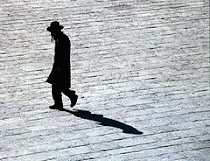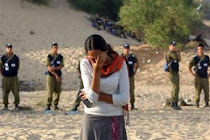

 Needed:
Needed:
A Bracha
A Picture
(Shortcut to: Elokei Neshama, Sh'lo Asani Goy, Matir Assurim)
I superimposed the text of each morning bracha onto an image that expresses or inspires my desired Kavana. This entails two soul-searching tasks: contemplating what the bracha actually means to me and then imagining what artistic form represents and reminds me of that Kavana.
For brachot that present worlds of varying interpretations, OBH forces us to be specific: to declare which Kavanot matter to us, which move us, and which leave us unimpressed or insulted. For brachot that seem abstract or antiquated, OBH compels us to think hard before muttering another day's worth of unexamined prayer.
With the Almighty's help, I will post a new bracha every four days, with some words of explanation and- for the controversial ones- justification.
Tell me if you enjoy the product of my labor. Tell me if you disagree with them. Try it for yourself and find out what you really think about each bracha.
One More Time:
Elokei Neshama, Sh'lo Asani Goy, Matir Assurim
Project #1: Operation Birchot HaShachar (OBH)
Posted by
Ben Greenfield
1 comments
![]()
Elohei Neshama
As long my soul is still within me, I thank you my God, the God of those I come from, master of all actions, lord of all souls. Baruch Atah Hashem, Elokeinu Melekh Ha'Olam, who will return souls to the bodies of the dead. [1]
1. The personal, singular, conversational tone between man and God, where the most common Divine name is “You.”
2. Many prayers describe Hashem, but this one describes man. For the most part, God is mentioned only to relate His imprint in us.
3. In English, the soul is an “it”- metaphysical, distant, apart. But in Hebrew’s neutered tongue, the soul is a “she”- human, close, part of me. [2]
4. There are two ways to emphasize the second sentence. “You created her, you formed her, you breathed her into me, etc,” with the verse listing God’s many steps in the production of the soul. I find that meaningless. Rather, emphasize the you’s: my soul is pure because you created it, you formed it, etc.
5. For all the talk of creation, life, and breath, this tefilla twice mentions death. It’s inspiring in a way both powerful and chilling how the davener thanks God for that precious time while “my soul is still within me.”
6. In its original form, and according to the Rambam's psak, Elohei Neshama is said upon waking, much like the modern day Modeh Ani. [3]
Upon waking, we declare to God, “I am Pure, a product-piece of You, aware of the ‘Divine-amazing’ that is life while conscience of its fleeting nature.” This is not a particularly ritualistic or Judeo-centric prayer; it talks to the basics that compose our perceptions of life, identity, and destiny. Thus the picture. My first thought was a generic sunrise shot- you know, one of those nice views that we instinctively associate with purity, freshness, and God. But I soon realized that it needed a person- this prayer is not about spiritual realms, but about me. Nonetheless, the sun and its colors are still symbolic of God, and I fell in love with the (attempted) interaction between woman and Divine; is that not the tefilla’s central theme! Plus, the notion of sunset, while in my view more beautiful than sunrise, carries with that beauty a realization of the ever-looming end.
Notes:
[1] My translation is by no means literal; it’s written to stress in English select ideas and styles which can be read within the Hebrew. Translating "Avotei" as "those I come from" is a perfect example. "Forefathers" has a stiff and antiquated connotation in English which, I find, clashes with the rest of the text. But "those I come from" is clearly an important component of what we mean when evoking our esteemed ancestors.
[2] Obviously a Hebrew “she” is weaker, since it also describes words that would be genderless in English. (If you use “she” to describe dinner plates, deeming a soul feminine does not imply much.) Nonetheless, the weak-ish Hebrew “she” still outweighs the completely cold, neutral “it.”
[3] Brachot 60b; Hilchot Tefilla 7:3
Posted by
Ben Greenfield
0
comments
![]()
On Sincerity
How can you possibly say this bracha while bearing in mind two thousand years of slaughter and exile? Can you honestly bless God for making you a Jew? Is an insincere blessing permitted?
Granted, you can argue the situation in 2007 is different- but was your great-grandfather foolish or just deluding himself?
The point with the picture (and yes, those are Nazis cutting off a Jew’s beard) is that you have to confront this image before making the bracha. If your kavana can’t pass the test of a Holocaust, then it needs to be reworked.
Personally, I bless God for including me in the special mission he gave the Jewish people. To be a Goy Kadosh and Memlekhet Cohanim which strives l’Taken Olam b’Malkhut Shakai. It is a mission that grows more noble, more ambitious, and more necessary with every additional pogrom or suicide bombing. This, in my eyes, is the tragic but courageous meaning of Naaseh v’Nishmah: hey, we know what we were getting ourselves into. It may not be pretty, but I pray it is sincere.
Posted by
Ben Greenfield
0
comments
![]()
On Interactive Prayer
The Rambam [1] said this bracha while sitting up from bed: the first movement of the day, the energetic transition from rest to motion. The picture captures it nicely.
[1] Hilchot Tefilla 7:4
--Looking for more Kavana in your morning brachot? Say them in their proper place in your morning drill. ("Who straightens the bent" when you first stand up; "Who clothes the naked" while you get dressed; etc.) Check out Mishneh Torah Hilchot Tefilla 7 for more details. For the record, this was Hazal's practice, but it has not been maintained in most Halachic works. Ask your local Orthodox rabbi; don't forget to tell him how cool it is. If all else fails, check for Yemenite ancestry.
Posted by
Ben Greenfield
0
comments
![]()
The Questions we Face in our Search for Kavana
Does Psukei D'Zimra matter to you? Not likely. For us, saying all the words of Uva L'Tzion is an accomplishment. For us, a good day means evading the daydreams that interrupt otherwise meaningless syllables and sounds. For us, by aspiring to mediocrity, we achieve it. The question therefore is, what are we doing about it?
There are three steps to Kavana:
1. Meaning: What the words are actually about.
2. Meaningful: Translating that academic knowledge into a prayer experience.
3. Means: Finding creative and effective ways to make that Kavana happen as often, and as powerfully, as possible.
The Kavana Project thus has three goals: to expose what we know about tefillot and theorize about what we don’t; to explore and debate the different kavanot that each tefilla offers; to suggest and implement methods to create that perfect davening experience.
Project #1: Operation Birchot HaShachar
Posted by
Ben Greenfield
0
comments
![]()
Meaning?
When our generation appears before the Heavenly Court, let them question our Talmud Torah, our attempts at Chessed, or our Yirat Shamayim. But, O Lord, what will we answer if they ask us to explain what the words we say three times a day are all about?
People of Israel, it's time to do our homework.
For each phrase, we have to know . . .
a. What the words mean.
b. Their source in larger bodies of literature. (Tanach, Shas, Medrash, etc., if that be the case.)
c. Other tefillot in which they appear.
Once we have the words down, we direct our attention to each passage as a whole. We must discover:
a. The overall structure of the piece.
b. Who authored it, what spurred him/her to write, what they tried to accomplish in doing so.
c. Where and when the passage is placed in davening, and how that reflects upon its meaning.
Posted by
Ben Greenfield
0
comments
![]()
Meaningful?
Sort of like the difference between Rifaeinu for most of us and Rifaeinu for those with a loved one in the hospital.
But what is "meaningful?" I, like every other davener in the world, can differentiate between a meaningless or quality davening- but can we express in words what it is that actually creates a great prayer experience? Emotion? Care? That magical sense of encountering the Divine? It's a tough question.
I know this much: this
is meaningful, but it takes five minutes to listen to. Whether or not we share the same taste (pay attention to the words!) the point remains the same: the powerful, tragic emotions of sound (or stage) grace us with that cathartic bliss that I for one equate with “meaningful.” Can that powerful, emotional, human effect of quality music be reproduced in the humdrum context of weekday Mincha- I believe so. My goal consists of making my prayers as moving as my music.
Obviously, “meaningful” denotes much more than “being like music” but as stressed above, its a tough and ambiguous equation. The best definition I have right now is "Meaningful tefilla: a prayer that you enjoy enough to look forward to."
That, my friends, is our mission.
Posted by
Ben Greenfield
0
comments
![]()






